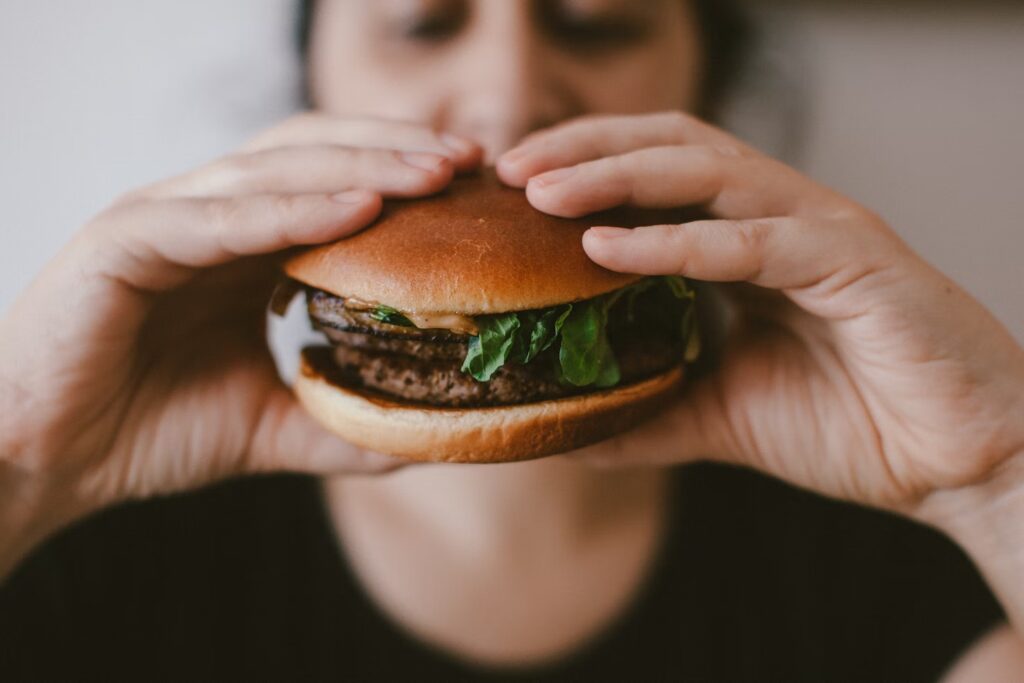When a person binge consumes large amounts of food in a short period of time, usually in the presence of a feeling of loss of control. Guilt and shame are associated with binge eating disorder and can lead to more episodes of binge eating, perpetuating the disordered eating cycle.
Both physical and mental health can be negatively affected by binge eating disorder. Health problems such as obesity, diabetes, high blood pressure, and heart disease can be suffered. In addition to having physical consequences, binge eating can also cause significant emotional distress, especially if the person feels out of control.
What causes binge eating?

Several factors are believed to contribute to the development of binge eating disorder, although its exact causes are not fully understood. A history of trauma or abuse can also contribute to these factors, as well as genetic, social, and cultural factors.
In binge eating disorder, you regularly eat large amounts of food for short periods of time until you feel uncomfortably full.
“Special” foods can be included in binges that are planned in advance and usually done alone. It is possible to feel embarrassed after a binge.
Binge eating disorders can affect both men and women of any age, but are most common in the late teens and early twenties.
A person with a binge eating disorder usually receives therapy and medication along with lifestyle changes, such as eating healthier and exercising more. Compulsive overeaters can manage their symptoms with the right support and improve their overall health.
Symptoms of binge eating disorder
Eating a lot of food in a short period of time is the main symptom of binge eating disorder. Other symptoms would be:
- Eating when you’re not hungry
- Getting used to eating too fast
- Having secret meals or eating alone
- Feeling sadness, guilt, shame, or disgust when eating.
- hide how much you eat
- Storing food everywhere so it’s close at hand
- Significant weight gain, although this is not the case for all people who suffer from this disorder.
Getting treatment for binge eating disorder

It’s important to see your GP if you suspect you may have a binge eating disorder. Your eating habits, emotional state, and weight will be discussed.
If your GP thinks you have an eating disorder, they should refer you to an eating disorder specialist or a team of specialists.
You can also call helplines to speak in confidence with an adviser.
Help someone else
If you are worried about a family member or friend, express it and encourage them to see a doctor. It would be nice if you could accompany him or her.
A person with binge eating disorder can recover with the right support and treatment, but it can take time.
The causes of binge eating
Eating disorders are not known to have exact causes, but you are more likely to have one if:
- There are cases of eating disorders, depression, or alcohol or drug abuse in your family or in your close social circle
- Being criticized for your eating habits, body shape, or weight
- You are too concerned about looking skinny, especially if you feel pressure from society or your job, as happens with ballet dancers, models, or athletes.
- You are anxious, have low self-esteem, dysphoria, or are a perfectionist
- If you have been sexually abused
Treatment of binge eating disorders

Support usually helps people overcome binge eating disorders.
First, a self-help program is likely to be offered as a means of dealing with binge eating disorder. The therapy is based on sessions with a health professional experienced in eating disorders.
There are mainly two types of treatments: Programs that guide the self-help process, and a type of talk therapy called cognitive behavioral therapy (CBT), which is done in groups or individually.
This can help you:
- Keeping track of what you eat, which can help you spot patterns in your behavior and change them.
- You can regulate your eating habits by making realistic meal plans for what to eat and when
- You can avoid binge eating by learning your triggers and recognizing, intervening, and preventing them.
- Work on the underlying causes of your disorder in a healthier way by understanding the causes
- Cope with your feelings in other ways
- Develop a healthy weight management strategy
Cognitive behavioral therapy (CBT)
Support groups for people with binge eating disorders can also be helpful. If you don’t get enough help in a four-week period, it would be best to get cognitive behavioral therapy or medication.
In a group session, you should expect to spend about 90 minutes, and in an individual session, about 60 minutes.
The goal of cognitive behavioral therapy is to explore patterns of thoughts, feelings, and behaviors that may be contributing to your eating disorder with the help of a therapist.
They will help you:
- You can adopt regular eating habits by planning your meals and snacks throughout the day.
- Determine what triggers your binge
- Managing negative body image feelings and changing them
- Do not relapse into binge eating while maintaining your new eating habits
- If you try to diet while receiving treatment, you may have trouble stopping binge eating.
Medicines

It is not recommended to treat binge eating disorder with antidepressants alone. However, antidepressants may be prescribed along with therapy or self-help treatments to help you manage other conditions, such as anxiety or depression, social phobia, and obsessive-compulsive disorder (OCD). Antidepressants are rarely prescribed for children or young people under 18 years of age.
Now that you know more about this eating disorder, keep reading at EMC about other aspects of health:


